Mifuatano: Core Curriculum - Socio-Emotional - 9 to 11 - Year 1
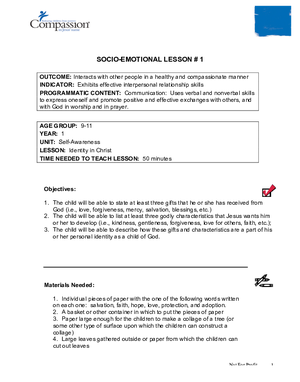
Uhajitaji Kuingia
Lazima uwe mmoja wa jamii ya ForChildren.com ili upakue rasilimali. Bofya vitufe vilivyo hapa chini ili uingie au ujisajili!
| Kategoria | Mihemko ya Kijamii |
| Copyright Owner and Year | Compassion International , 2024 |
The Core Curriculum for children between the ages of 9 and 11 includes 37 individual lessons to help develop the children socio-emotionally, specifically through emphasizing concrete development skills in the “Self-Awareness,” “Sexual Development,” “Advocacy,” “Communication Development,” and “Emotional Development” units. Children learn about positively developing themselves as they grow older, how to better relate to others, and how to rely on God-given talents to best interact and prosper in life. Each lesson includes guided instructions for the teacher, including preparation, a script, and suggested activities to facilitate further learning in a fun and interactive manner.
For child protection resources, see the following lessons: Comfort vs. Discomfort – Part 1 (Lesson 17), Comfort vs. Discomfort – Part 2 (Lesson 18), Good Touch vs. Bad Touch (Lesson 19), Assertive Vocabulary (Lesson 20), Good Secrets vs. Bad Secrets (Lesson 21), Developing a Safety Plan (Lesson 22), Getting Help for a Friend (Lesson 23).
Hati
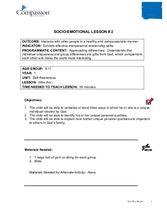
Who Am I?
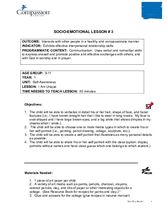
I Am Unique
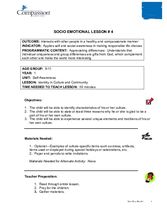
Identity in Culture and Community
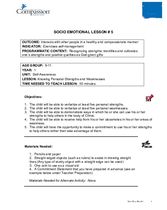
Knowing Personal Strengths and Weaknesses
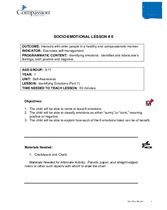
Identifying Emotions (Part 1)
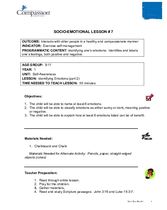
Identifying Emotions (Part 2)
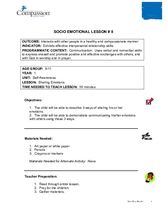
Sharing Emotions
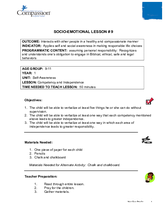
Competency and Independence
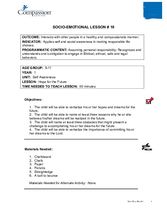
Hope for the Future
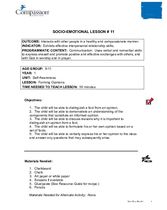
Forming Opinions
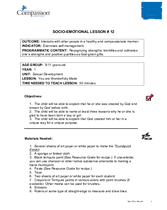
You Are Wonderfully Made
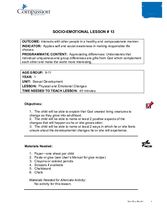
Physical and Emotional Changes
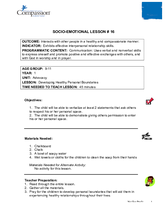
Developing Healthy Personal Boundaries
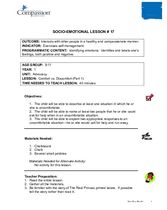
Comfort vs. Discomfort (Part 1)
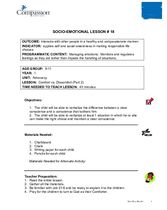
Comfort vs. Discomfort (Part 2)
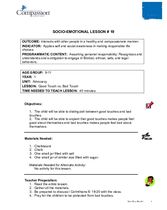
Good Touch vs. Bad Touch
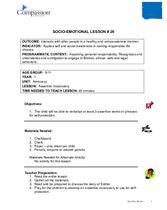
Assertive Vocabulary
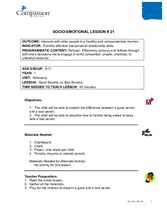
Good Secrets vs. Bad Secrets
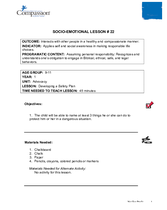
Developing a Safety Plan
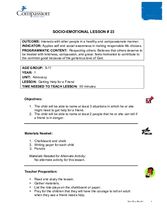
Getting Help for a Friend
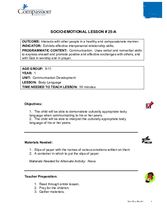
Body Language
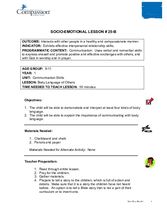
Body Language of Others
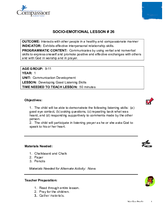
Developing Good Listening Skills
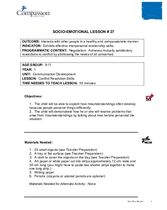
Conflict Resolution Skills
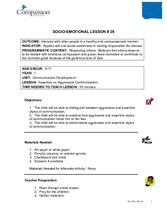
Assertive vs. Aggressive Communication
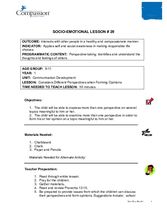
Considers Different Perspectives when Forming Opinions
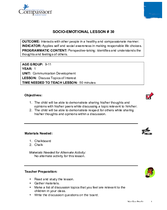
Discuss Topics of Interest
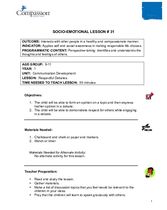
Respectful Debates
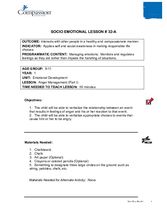
Anger Management (Part 1)
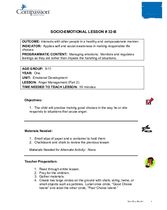
Anger Management (Part 2)
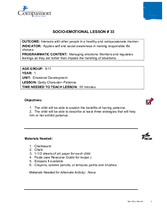
Godly Character - Patience
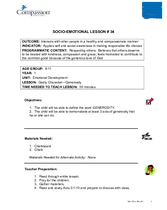
Godly Character - Generosity
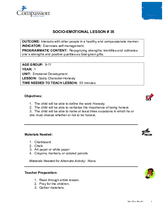
Godly Character - Honesty
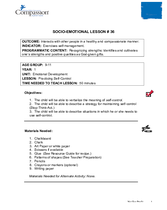
Practicing Self Control
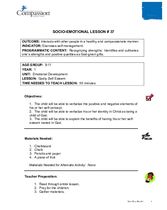
Godly Self Esteem
Hati Zinazohusiana
-
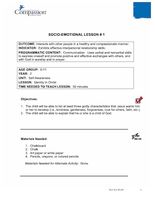
Core Curriculum - Socio-Emotional - 9 to 11 - Year 2
Mifuatano - 40 RasilimaliThe Core Curriculum for children between the ages of 9 and 11 includes 42 individual lessons to help develop the children socio-emotionally, specific… -
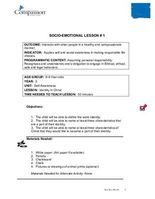
Core Curriculum - Socio-Emotional - 6 to 8 - Year 1
Mifuatano - 36 RasilimaliThe Core Curriculum for children between the ages of 6 and 8 includes 43 individual lessons to help develop the children socio-emotionally, specifica… -
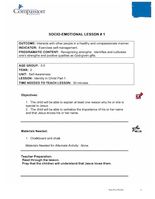
Core Curriculum - Socio-Emotional - 3 to 5 - Year 2
Mifuatano - 41 RasilimaliThe Core Curriculum for children between the ages of 3 and 5 includes 41 individual lessons to help develop the children socio-emotionally, specifica… -
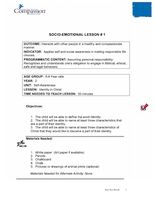
Core Curriculum - Socio-Emotional - 6 to 8 - Year 2
Mifuatano - 39 RasilimaliThe Core Curriculum for children between the ages of 6 and 8 includes 45 individual lessons to help develop the children socio-emotionally, specifica… -

Forming Opinions
The lesson “Forming Opinions” teaches children the importance of interpersonal relationship skills and communication in order to have pos… -
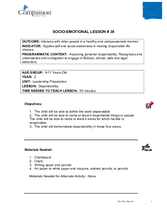
Dependability
The lesson “Dependability” teaches children the importance of being dependable to others as the trait relates to interpersonal relationsh… -
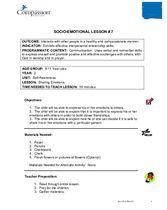
Sharing Emotions
The lesson “Sharing Emotions” continues to teach children about the importance of communication in interpersonal relationships and how to… -
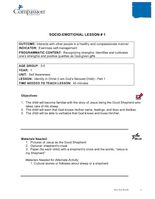
Core Curriculum - Socio-Emotional - 3 to 5 - Year 1
Mifuatano - 45 RasilimaliThe Core Curriculum for children between the ages of 3 and 5 includes 43 individual lessons to help develop the children socio-emotionally, specifica… -

Anger Management (Part 2)
The lesson “Anger Management (Part 1)” teaches children about the application of self and social awareness in terms of monitoring and man… -

Anger Management (Part 1)
The lesson “Anger Management (Part 1)” teaches children about the application of self and social awareness in terms of monitoring and man…
ForChildren.com inatolewa na Compassion International, shirika lisilo la faidia lililosajiliwa 501(c)3. Nyenzo, kozi, na majadiliano yote yanakusudiwa kwa matumizi ya elimu peke yake, na sio kwa faida.
